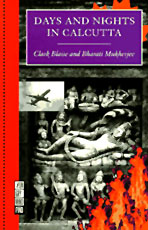 `Days and Nights in Calcutta` by Bharati Mukherjee is the author`s personal experiences while she comes back to India after her marriage with the Canadian writer Clerk Blaise. The title rightly depicts the experiences of coming back to India. That`s why it says days and nights. Each of them jotted down their feelings in different documents and lastly made the volume.
`Days and Nights in Calcutta` by Bharati Mukherjee is the author`s personal experiences while she comes back to India after her marriage with the Canadian writer Clerk Blaise. The title rightly depicts the experiences of coming back to India. That`s why it says days and nights. Each of them jotted down their feelings in different documents and lastly made the volume.
Bharati Mukherjee always focuses on some issues related to the "phenomenon of migration, the status of new immigrants, and the feeling of alienation often experienced by expatriates". She also focuses on Indian women and their struggle in some of her novels. Her own struggle with identity has come up again and again in many of her writings. At first she lives as an exile from India, then an Indian expatriate in Canada, and finally as a immigrant in the United States has lead to her current contentment of being an immigrant in a country of immigrants. She always tried to find her identity in her Indian heritage, which she failed sometimes. Her first published novel `The Tiger`s Daughter` parallels her own venture back to India with Clark Blaise in 1973 when she was deeply affected by the chaos and poverty of India. The women of India were mistreated at that time in the name of tradition, which affected the thought of author to a great extent. Another phase of her writing saw some tinge of racism in Canada that the author experiences of her own. Where despite being a tenured professor, she felt humiliated at some point of her time.
Synopsis:
`Days and Nights in Calcutta`, is a shared account of the first trip to Kolkata of Bharati Mukherjee and her husband Blaise. He was the co-author of this piece of work. The couple took to India together after being married. Each offers a different India through their separate journals, and ultimately, the two tell the tale of a relationship that faces the daily difficulties of two different cultural background and their barriers. This is mainly known as her autobiographical narrative. In `Days and Nights in Calcutta`, Bharati Mukherjee explores the cultural tensions implicit in her life as a privileged Indian woman who returns to her homeland after becoming a Canadian citizen. Her Canadian husband Clark Blaise, attempts to understand the traditions and the emerging political tensions of his wife`s native land. Separated into two sections, the book is an unromanticised, raw, humorous, spiritual, political and personal account of an India. At that time the country experiences pains due to the clashes between traditionalism and the insurgence of Western capitalism in 1973. The book also contains the narratives as the writer`s thoughts and observations on topics ranging from class conflict to feminism, and also from racism to personal enlightenment. Told from the perspective of a native Indian and a native Canadian, the book offers independent portrayals of India from both Eastern and Western perspectives.
Published by Grove Press the `Days and Nights in Calcutta` is a joint write-up of Bharati Mukherjee and her Canadian writer husband Clerk Blaise.
In `Days and Nights in Calcutta` the author narrates her own experiences of coming back to India after fourteen years. These perspectives reflects the internal conflict that Mukherjee experiences as an Indian woman who has left her traditional home to settle in the highly intolerant atmosphere of the West. In the process, Mukherjee examines the passed-over possibilities of her life as an upper-middle-class Indian woman. She talks to women of different background and gets the feel of Indian scenario. Actually she wanted to come back to her own culture and diminishes the lengthy gap and somehow unable to do so.



















